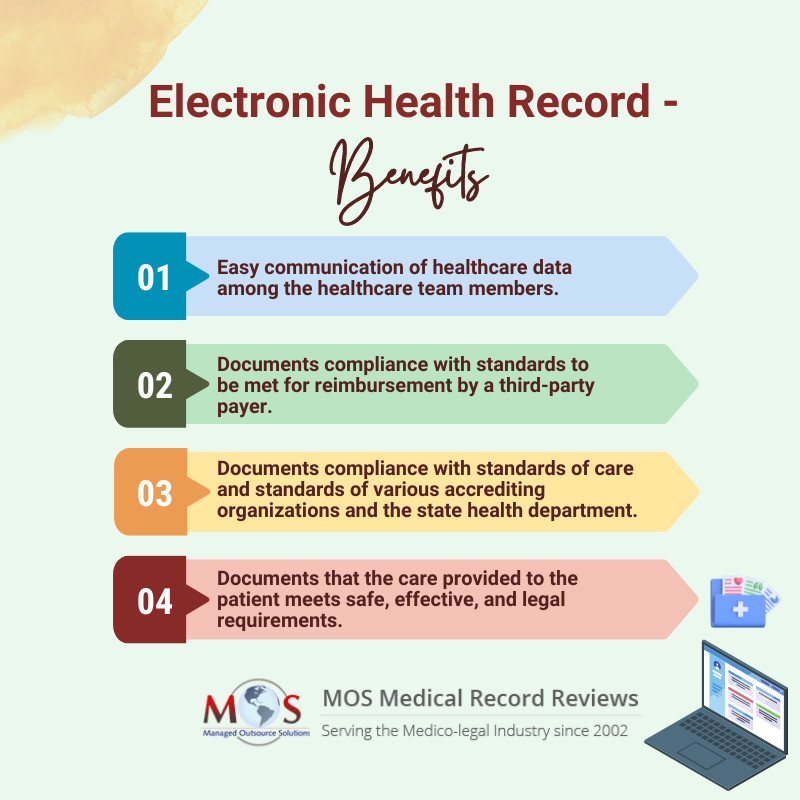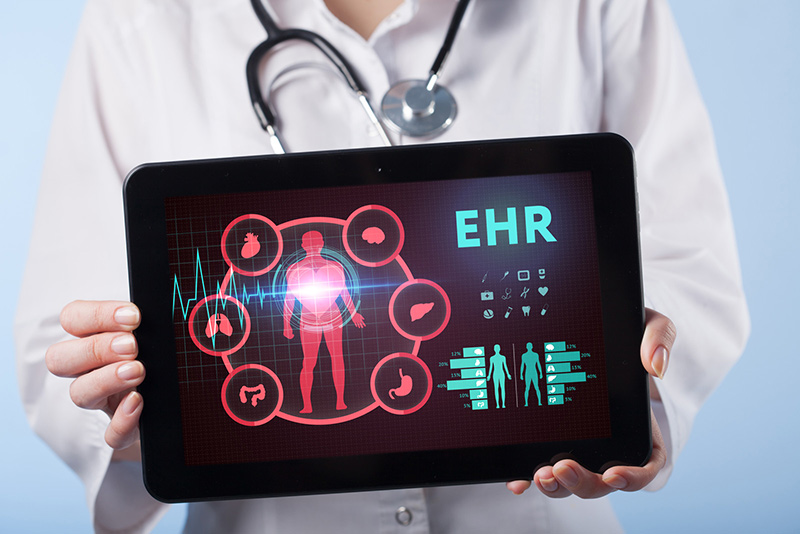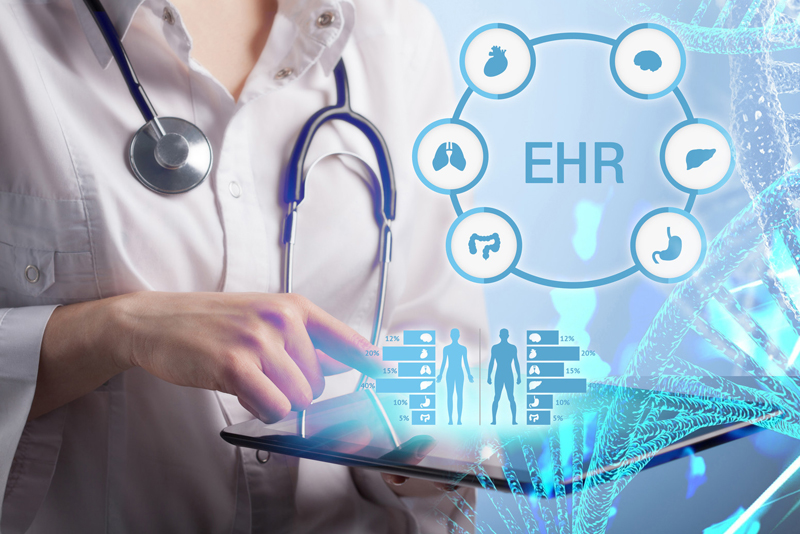Whether to understand the type of care provided to the patient, for medical record review, for obtaining billing information, or for information exchange, the electronic health record or EHR is much more efficient and convenient than traditional paper records. One of the important uses of the EHR is as a legal record. It contains detailed health information about the patients in digital format and is designed to share information with other healthcare providers/organizations such as laboratories, medical imaging facilities, emergency facilities and pharmacies among other entities. The EHR contains information from all clinicians involved in the care of a patient.
Benefit from value-added medical record review services from MOS Medical Record Reviews!
Features that Distinguish the Electronic Health Record
A good EHR system maintains an accurate record of a patient’s medications and allergies among other important information. It checks for any issues or concerns whenever a new medicine is prescribed and creates alerts for the physician regarding potential conflicts. Since information regarding allergies is recorded in the EHR by the primary care provider, if the patient is admitted in the ED for some emergency care, the clinician is alerted regarding the allergy and the emergency staff can adjust care accordingly even if the patient is unconscious.
An important advantage of the EHR is that it helps improve risk management by providing clinical alerts and reminders. A 2019 study made by researchers at Penn Medicine shows that EHR alerts may be more effective in encouraging physicians to prescribe preventive therapy than educating physicians on the value of such therapies. The research team employed both peer education and EHR alerts to update doctors on which patients may benefit from acid suppression therapy, which is considered useful to reduce the risk of gastrointestinal bleeding in at-risk cardiac patients. The researchers found that while education on acid suppression therapy didn’t make a significant impact on prescribing rates, EHR alerts recommending preventive therapies contributed to an 18% increase in prescribing rates. The study proved that although clinical leaders should work together to identify best practices, care redesign, technology, and behavior change strategies are also required. Before launching the EHR-integrated dashboard, prescription rates for cardiac patients who may benefit from acid suppression therapy was less than 73%. After launching the EHR alerts, prescription rates increased to more than 86% for patients in the health system’s Cardiac Intensive Care Unit. This study demonstrated that EHR alerts can improve patient health outcomes in diverse areas of care by prompting providers to employ preventive therapies.
EHRs can help improve the collection of patient data, its analysis and sharing among the care team. By making it much easier to study all aspects of a patient’s condition, EHRs help speed up diagnostic and therapeutic decision making. The comprehensive medical information available helps prevent adverse events, and alerts providers against prescribing treatments that could lead to unfavorable events.
The legal requirements for maintaining electronic health records are more complex than those for paper health records. If these are not maintained in a legally sound way, they could very well be challenged as invalid. The EHR must be properly designed and providers must be able to use it appropriately in strict adherence to federal and state rules, as well as institutional requirements and additional certification standards applicable to the healthcare organization.
Medical Chart Review Made Easier with EHRs
With the emphasis placed on value-based reimbursement, healthcare providers need to focus on ways to improve patient care and treatment outcomes. Medical chart review is an important process used to evaluate patient data to understand the particular health condition or disease and the results of treatment protocols. Chart review is also significant from the point of view of health insurance reimbursement. While this process is a primary method employed for quality improvement, there are other measures also that can be adopted with a view to improve healthcare quality. Preventive measures are very important in this regard. The electronic health record (EHR) is credited for its capability to enhance the quality of care provided to patients and many physicians have acknowledged this already.
Patients are ensured better medical care when healthcare providers have access to complete and correct medical data. The EHR can help improve diagnosis and reduce or even prevent medical errors and thereby ensure improved patient outcomes. According to healthit.gov data,
- 94% of providers say their EHR makes medical records easily available at point of care
- 88% of them say their EHR produces clinical benefits for the practice
- 75% report that their EHR enables them to provide better patient care.

What information does an electronic health record contain?
- Patient demographics
- Administrative and billing information
- Progress notes
- Vital signs
- Diagnoses
- Medications
- Immunization details
- Medical history
- Allergies
- Radiology images
- Lab and test results
The Legal Aspect of the Electronic Health Record
The primary purpose of medical record documentation is to ensure superior quality patient care. However, when errors creep into the health record, it poses risk to the patient and also has legal implications. Issues in documentation can become really serious when there are allegations of malpractice, medical negligence, failure to meet standards of care, and so on. Proper and accurate documentation will reduce the risks of a lawsuit against the healthcare provider and the organization employing him or her.
Certified electronic health records can help providers avoid liability actions by
- Making available complete, clear records for the defense (reconstructing what actually took place at the point of care)
- Proving adherence to the best evidence-based practices
- Revealing evidence that suggest informed consent
The charting errors to avoid include the following:
- Not recording relevant health or medication information
- Failing to record nursing actions
- Recording in the wrong patient’s medical record
- Failing to record medication administration
- Not recording a medication that has been discontinued
- Failing to note down drug reactions or changes in the patient’s condition
- Failing to transcribe orders properly or transcribing improper orders
- Preparing incomplete or illegible medical records
Providers must necessarily avoid the above charting errors to prevent medical malpractice allegations and lawsuits. Mostly, discrepancies in the medical record create considerable challenges when defending a malpractice suit. Such inconsistencies usually involve physicians, nurses, advanced practice clinicians, EMS personnel and any records associated with the patient. The discrepancy may only be a minor difference in terminology used in the record but sometimes these discrepancies can be serious ones.
Typical examples of discrepancies in medical record documentation are found when recording the following:
- Details of injuries
- Medication lists
- Differences in describing pain and other complaints
- Neurological and abdominal exams
- Patient response to treatments
As a medical review services provider to medical malpractice and personal injury attorneys, we can say that accurate and concise medical record documentation is vital to provide patients with high-quality care, mitigate malpractice risks, and ensure timely and accurate payment for all healthcare services provided to the patient. Accurate medical records enable providers to evaluate, plan and provide proper treatment to the patient across the healthcare continuum.
The electronic health record provides many advantages to the medical, legal, and insurance businesses. It makes medical record retrieval easy for a medical chart review company and thereby speeds up the review of medical records that is so important from a legal as well as a medical perspective. There are yet shortcomings to be addressed and EHR vendors are collaborating with providers to develop the best systems customized for diverse medical specialties.




